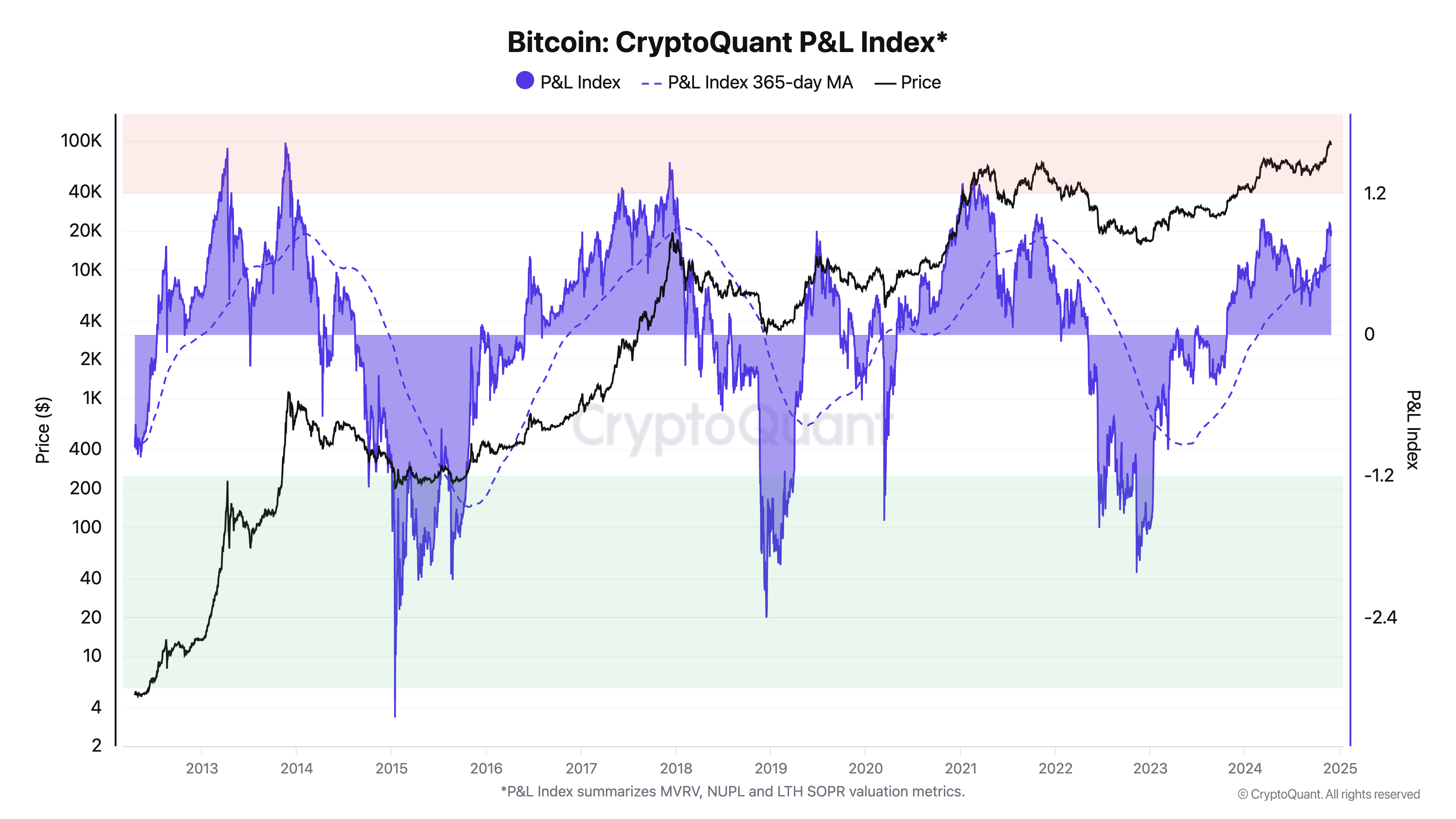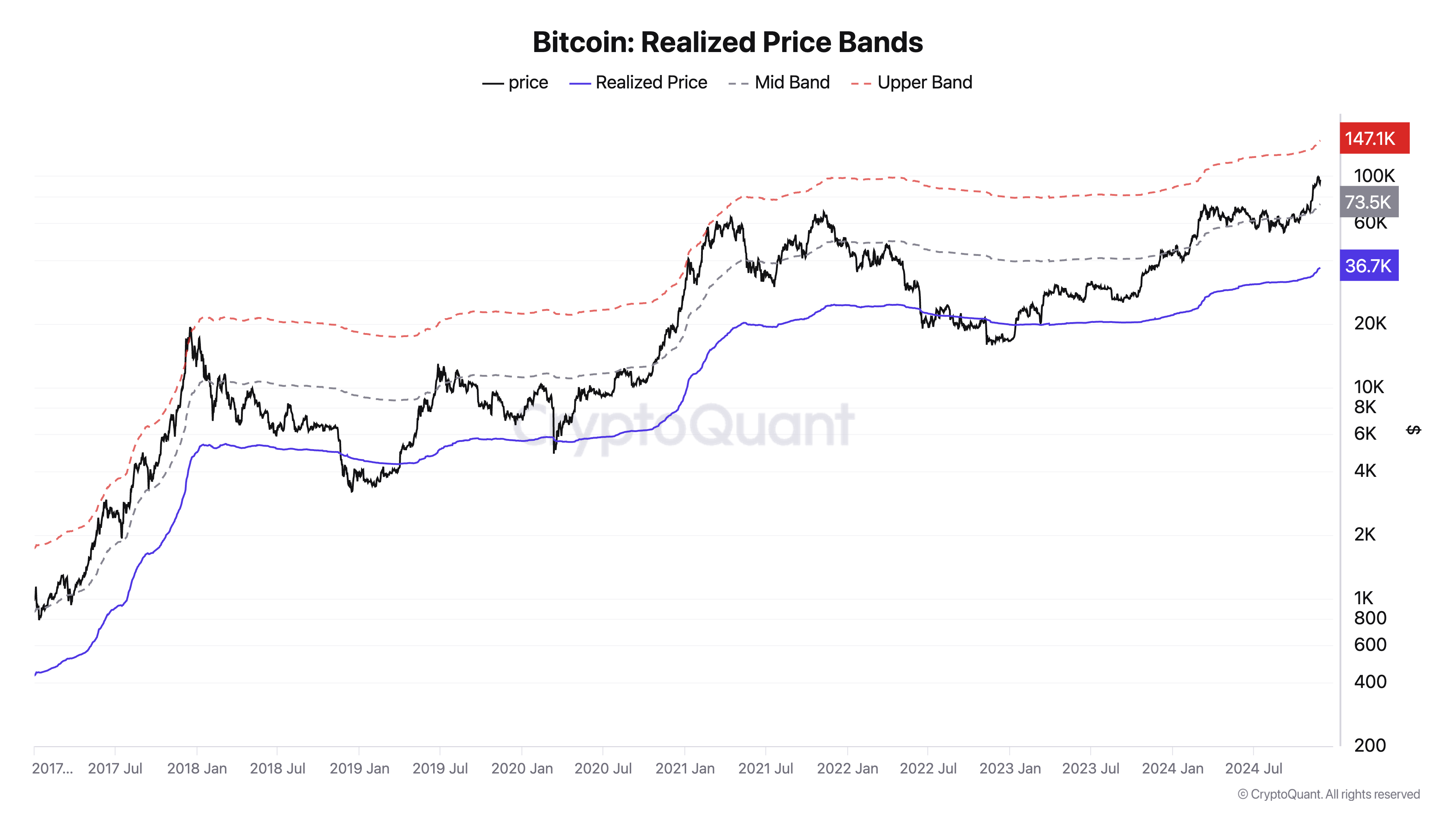Uncategorized
Bitcoin to Overcome $100K Despite Pullback, Has Plenty of More Room Before Topping: CryptoQuant

Bitcoin’s (<a href=»https://www.coindesk.com/price/bitcoin» target=»_blank»>BTC</a>) pullback from the $100,000 level after continuously hitting fresh new highs is only a temporary setback before eventually shooting past the barrier to even higher prices, crypto analytics firm CryptoQuant said.
According to a Wednesday report shared with CoinDesk, multiple blockchain data metrics suggest that the largest crypto has more room to run before topping.
CryptoQuant’s custom P&L index, which combines several on-chain valuation metrics to signal whether BTC is overvalued or undervalued, shows that the asset is firmly in a bull market but far from the overvalued levels it reached at the previous market peaks in 2021, 2017 and 2013.

The firm’s Bull-Bear Market Cycle Indicator has only started to heat up after dipping slightly into bear market territory earlier this year as BTC corrected from March’s record $73,000 to $50,000. The metric is nowhere near the overheated levels seen at local tops at this March or other local tops.
Meanwhile, participation of retail investors is still muted, contrary to the typical buying frenzy observed around previous cycle tops. Per CryptoQuant data, retail sold 41,000 bitcoin since October lowering their holdings likely to take profits. Large investors, meanwhile, increased holdings by 130,000 BTC during the same period.
New investors aren’t rushing to enter the market either. The value of BTC held by new investors, or addresses holding the asset since less than six months ago, stands at 50% of the total value invested in bitcoin (Realized Cap). That’s far below the 80%-90% levels in 2017 and 2021.
«Price tops typically occur when new investors enter the market to buy at extremely high prices, which causes them to hold a large proportion of the total value invested,» the authors said. «Previous bull cycles have ended when retail investors buy aggressively, which is not the case today.»
Bitcoin’s peak target
Over the past week, BTC’s violent run-up after Donald Trump’s U.S. election victory was halted at the $100,000 barrier, sliding back as much as 9% from its latest record. On Thursday, CoinDesk data shows, it changed hands at around $95,000.
Despite the setback, surpassing the $100,000 barrier is only a matter of time, CryptoQuant analysts said.
Previous bitcoin bull markets topped around the upper band of bitcoin’s realized price metric, set at four times the average price at which all BTC in circulation has been transferred for the last time. Data shows that the realized price is currently at $36,000-$37,000 and quickly rising, marking the upper band at $147,000.
If the pattern repeats, BTC could rally to at least $147,000 before reaching a market cycle top, per CryptoQuant.

CryptoQuant isn’t the only firm that is bullish on bitcoin’s rally. Recently, Galaxy Research said the price is expected to reach $100,000 in the near term and may run up higher, citing increasing institutional adoption and the potential for the creation of bitcoin nation-state reserves.
Read more: <a href=»https://www.coindesk.com/markets/2024/11/27/bitcoin-bull-market-is-far-from-over-galaxy-research-says» target=»_blank»>Bitcoin Bull Market Is Far From Over, Galaxy Research Says</a>
Business
Crypto Trading Firm Keyrock Buys Luxembourg’s Turing Capital in Asset Management Push

Crypto trading firm Keyrock said it’s expanding into asset and wealth management by acquiring Turing Capital, a Luxembourg-registered alternative investment fund manager.
The deal, announced on Tuesday, marks the launch of Keyrock’s Asset and Wealth Management division, a new business unit dedicated to institutional clients and private investors.
Keyrock, founded in Brussels, Belgium and best known for its work in market making, options and OTC trading, said it will fold Turing Capital’s investment strategies and Luxembourg fund management structure into its wider platform. The division will be led by Turing Capital co-founder Jorge Schnura, who joins Keyrock’s executive committee as president of the unit.
The company said the expansion will allow it to provide services across the full lifecycle of digital assets, from liquidity provision to long-term investment strategies. «In the near future, all assets will live onchain,» Schnura said, noting that the merger positions the group to capture opportunities as traditional financial products migrate to blockchain rails.
Keyrock has also applied for regulatory approval under the EU’s crypto framework MiCA through a filing with Liechtenstein’s financial regulator. If approved, the firm plans to offer portfolio management and advisory services, aiming to compete directly with traditional asset managers as well as crypto-native players.
«Today’s launch sets the stage for our longer-term ambition: bringing asset management on-chain in a way that truly meets institutional standards,» Keyrock CSO Juan David Mendieta said in a statement.
Read more: Stablecoin Payments Projected to Top $1T Annually by 2030, Market Maker Keyrock Says
Business
Crypto Trading Firm Keyrock Buys Luxembourg’s Turing Capital in Asset Management Push

Crypto trading firm Keyrock said it’s expanding into asset and wealth management by acquiring Turing Capital, a Luxembourg-registered alternative investment fund manager.
The deal, announced on Tuesday, marks the launch of Keyrock’s Asset and Wealth Management division, a new business unit dedicated to institutional clients and private investors.
Keyrock, founded in Brussels, Belgium and best known for its work in market making, options and OTC trading, said it will fold Turing Capital’s investment strategies and Luxembourg fund management structure into its wider platform. The division will be led by Turing Capital co-founder Jorge Schnura, who joins Keyrock’s executive committee as president of the unit.
The company said the expansion will allow it to provide services across the full lifecycle of digital assets, from liquidity provision to long-term investment strategies. «In the near future, all assets will live onchain,» Schnura said, noting that the merger positions the group to capture opportunities as traditional financial products migrate to blockchain rails.
Keyrock has also applied for regulatory approval under the EU’s crypto framework MiCA through a filing with Liechtenstein’s financial regulator. If approved, the firm plans to offer portfolio management and advisory services, aiming to compete directly with traditional asset managers as well as crypto-native players.
«Today’s launch sets the stage for our longer-term ambition: bringing asset management on-chain in a way that truly meets institutional standards,» Keyrock CSO Juan David Mendieta said in a statement.
Read more: Stablecoin Payments Projected to Top $1T Annually by 2030, Market Maker Keyrock Says
Business
Gemini Shares Slide 6%, Extending Post-IPO Slump to 24%

Gemini Space Station (GEMI), the crypto exchange founded by Cameron and Tyler Winklevoss, has seen its shares tumble by more than 20% since listing on the Nasdaq last Friday.
The stock is down around 6% on Tuesday, trading at $30.42, and has dropped nearly 24% over the past week. The sharp decline follows an initial surge after the company raised $425 million in its IPO, pricing shares at $28 and valuing the firm at $3.3 billion before trading began.
On its first day, GEMI spiked to $45.89 before closing at $32 — a 14% premium to its offer price. But since hitting that high, shares have plunged more than 34%, erasing most of the early enthusiasm from public market investors.
The broader crypto equity market has remained more stable. Coinbase (COIN), the largest U.S. crypto exchange, is flat over the past week. Robinhood (HOOD), which derives part of its revenue from crypto, is down 3%. Token issuer Circle (CRCL), on the other hand, is up 13% over the same period.
Part of the pressure on Gemini’s stock may stem from its financials. The company posted a $283 million net loss in the first half of 2025, following a $159 million loss in all of 2024. Despite raising fresh capital, the numbers suggest the business is still far from turning a profit.
Compass Point analyst Ed Engel noted that GEMI is currently trading at 26 times its annualized first-half revenue. That multiple — often used to gauge whether a stock is expensive — means investors are paying 26 dollars for every dollar the company is expected to generate in sales this year. For a loss-making company in a volatile sector, that’s a steep price, and could be fueling investor skepticism.
-

 Business11 месяцев ago
Business11 месяцев ago3 Ways to make your business presentation more relatable
-

 Fashion11 месяцев ago
Fashion11 месяцев agoAccording to Dior Couture, this taboo fashion accessory is back
-

 Entertainment11 месяцев ago
Entertainment11 месяцев ago10 Artists who retired from music and made a comeback
-

 Entertainment11 месяцев ago
Entertainment11 месяцев ago\’Better Call Saul\’ has been renewed for a fourth season
-

 Entertainment11 месяцев ago
Entertainment11 месяцев agoNew Season 8 Walking Dead trailer flashes forward in time
-

 Business11 месяцев ago
Business11 месяцев ago15 Habits that could be hurting your business relationships
-

 Entertainment11 месяцев ago
Entertainment11 месяцев agoMeet Superman\’s grandfather in new trailer for Krypton
-

 Entertainment11 месяцев ago
Entertainment11 месяцев agoDisney\’s live-action Aladdin finally finds its stars




